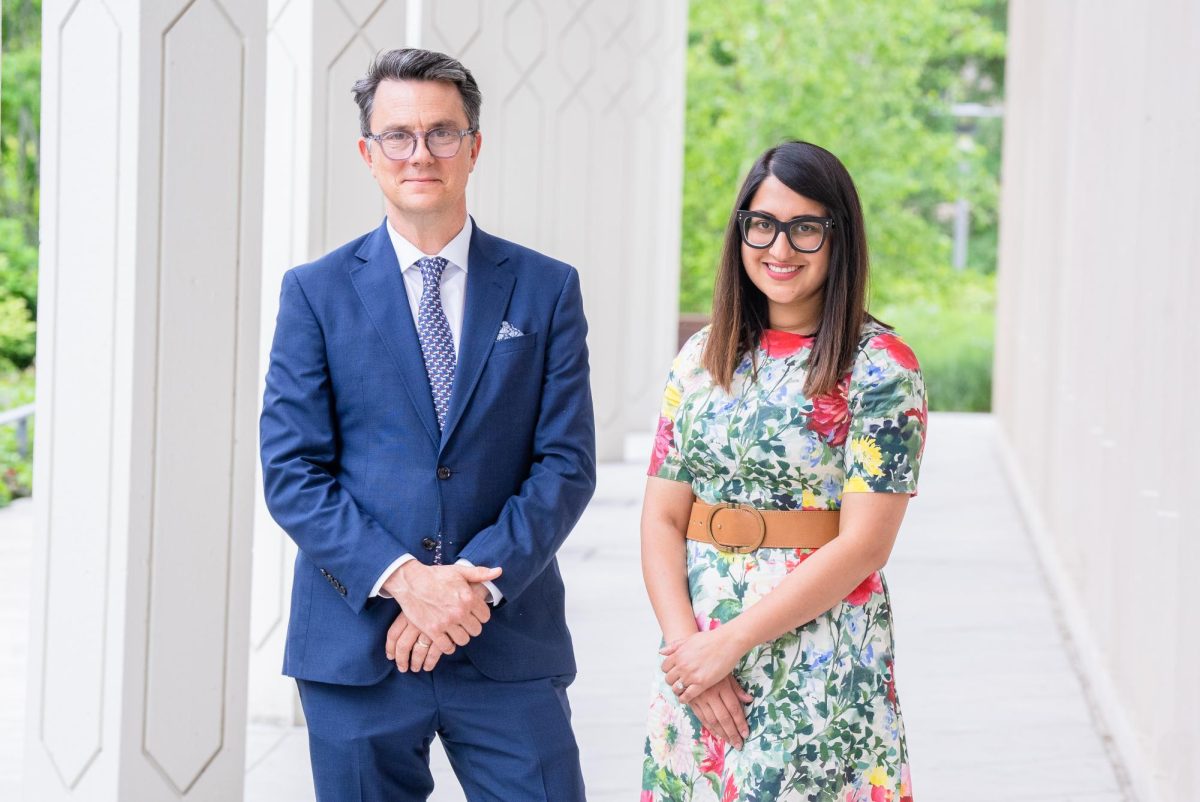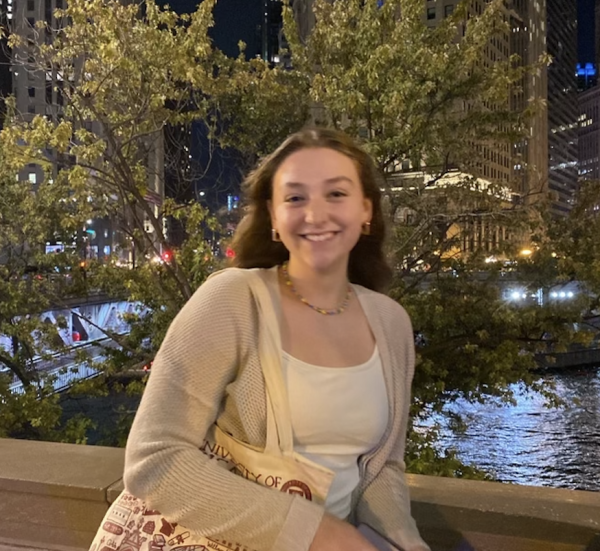Growing up, Sadia Sindhu wanted to serve her country, attending the Georgetown School of Foreign Service with an eye towards serving in the United States Government. But as a first-generation Muslim-American daughter of immigrants, Sindhu wishes that she had access to resources in college that could have helped her better understand how she could create a space for herself in an environment where almost no one looked like her.
Now, as the Executive Director of the University’s Center for Effective Government (CEG), Sindhu has made her dream a reality for students in her past position.
William Howell, Faculty Director of CEG, and Sindhu founded CEG in 2019. He says the center was created with an eye towards lifting up institutional reforms that might be constructive in building a more effective government and thereby safeguarding democracy.
To focus their mission, Sindhu thought about the role the University could play in democracy reform. This entails assisting institutions with redesigning and reimagining themselves to function as they ought to, so as to more effectively advance policies that actually deliver for constituents.
“It felt like such a natural fit for the resources at the University of Chicago which are so focused on scholarship and a non-partisan approach,” Sindhu said. “I think [Howell and I] both have a really good sense of what we want from the center, which is that we want to be a robust research center, while also being engaged with civic practitioners and active within the larger democracy reform ecosystem.”
While CEG and the University’s Institute of Politics (IOP) may sound like they have similar goals, Sindhu says they are two very different organizations. According to Sindhu, they differ in that CEG is first and foremost a research center that is specifically focused on institutional reform and how to make democracy more effective, while the IOP has a broader mission of political engagement.
The IOP also focuses on providing career opportunities to undergraduate and graduate students, while CEG provides programs and events geared more towards faculty members and civic practitioners.
However, CEG does, independently and in partnership with the IOP, student groups, the Harris Career Office, and UChicagoGRAD, provide activities and events for students. Sindhu believes getting exposure to the fellows and resources that CEG has to offer is a great opportunity for university students.
Anna Selbrede (A.B. ’22) worked for the center from the summer of 2020 until she graduated. She is now a first-year student at Yale Law School. Selbrede sees important differences between CEG and other groups on campus, and hopes the center becomes more well-known to undergraduate students so they have more opportunities to engage with it.
“I think that we spend a lot of time on campus learning about politics and getting opportunities to engage in politics, but it’s important for people to also see this side of academic analysis and then also practitioners doing effective government and democracy more at its core,” Selbrede said.
While working at the center over the summer, Selbrede researched similar organizations and proposed a plan for how the center should position itself in that space. She also researched different social media tone options and crafted a social communication plan.
During the school year, Selbrede ran an internal news and social media monitoring project, creating weekly reports on institutional reform news to help CEG stay informed. She also helped advertise, set up for, and run CEG’s various events throughout the year.
“I joined CEG because I was really interested in the world and institutional reform and systemic reform, and I thought that I wanted to do it from a policy perspective,” Selbrede said.
Selbrede says her work with CEG led to her interest in the legal side of politics and inspired her to apply to law school. She knew she was interested in public policy but was able to find legal organizations that paired law with institutional and election reform through the center.
Santiago Ginebra Campillo, a current second-year graduate student at the Harris School of Public Policy and graduate assistant at CEG, sees the center’s work as an opportunity to create a more effective government for the people.
Ginebra Campillo also recognized CEG as an opportunity to learn about the planning that goes on underneath the veneer of politics. He sees CEG as a great combination of politics and public policy.
“It’s the perfect spot in which those two things interact,” Ginebra Campillo said. “You have the ideas, a spectrum of research and, in that research, you decide what’s the perfect way to address a public problem.”
CEG divides its work into three key areas: scholarship, education, and engagement. For scholarship, the center provides funding to University professors to conduct research and to write papers and helps organize the Annual American Politics Conference. Sindhu says CEG has a focus on building a new, more diverse generation of scholars.
The center also frequently partners with the IOP to organize events catered towards undergraduate and graduate students, including the Chicago Treks program and the Harris Mentor Program, which facilitate discussion between students and public service practitioners surrounding political issues.
One of the educational programs Sindhu and Howell are proudest of is the Civic Leadership Academy, which brings together 30 civic leaders from across Chicago to engage with faculty and each other, with the goal of building civic infrastructure in Chicago. Current and former fellows span a variety of nonprofit and government agencies across the city.
Sindhu says the academy was designed to create a space where practitioners who are often on opposite sides of discussions can talk about their differences and experiences.
“We’ve been wanting to find a clear connection between scholarship and practice, particularly as it relates to effective government,” Sindhu said. “I think for me, a lot of that has to do with what I have experienced through the Civic Leadership Academy and through seeing our fellows and the challenges that they face which are often very much at the institutional level.”
Sindhu says the engagement piece largely manifests in CEG’s media partnerships. CEG also produces Not Another Politics Podcast with the Harris School to uplift faculty research.
Currently, CEG is also working with Chicago Public Media, WBEZ, and the Chicago Sun Times on the Democracy Solutions Project, an 18-month long venture that looks to increase solutions-based journalism, especially as the 2024 presidential election approaches and conversations about the state of American democracy escalate.
“[The Democracy Solutions Project has] been very meaningful for us because we recognize that it’s an opportunity to reach a larger audience and help shape the conversation in the public sphere,” Sindhu said.
Additionally, the center chooses four to five leaders who are civic practitioners and committed to democracy and institutional reform to participate in an annual non-residential fellowship called the Democracy Fellows Program. The 2023 fellow cohort marks CEG’s third year running the program.
In choosing the right fellows, both Howell and Sindhu see immense value in diversity in work experience, political ideology, and personal identity.
“We don’t want to bring out facsimiles of ourselves and have them just repeat back to us that which we say,” Howell said. “That’s not the point. The point is to say, we believe deeply in the need for institutional reform and building more effective government, but we don’t presume to have the precise answers about what’s needed, where, and for whom.”
The fellows engage in various activities and conversations with community members on campus, including office hours with individual students. Throughout the year, fellows may host a series of seminars, provide guest lectures or classes, or speak in panels.
“Each fellow’s work on campus depends on their own personal interests and what they want to do with their position,” Howell said. “The goal is simply to try to foster exchange between students, faculty, and the fellows.”
Sindhu hopes students find value in meeting people who had to put in the work to get where they are today.
“They are very keen on meeting students,” Sindhu said. “Almost every single fellow I’ve talked to, when we’re discussing their fellowship, has an example of someone who mentored them, so that piece is really important to them.”
Sindhu hopes the broader university community knows that CEG is an active research center that deeply cares about institutional reform and creating a more effective democracy.
“I want people to know that there are a host of activities that we do that serve faculty, that serve civic practitioners, that serve students, and that lift up work out of the university through our media partnerships, which I think really just differentiate us from a lot of other research centers,” Sindhu said. “We’re very focused on making sure that the work that we do is shared out into the world.”
Howell is proud of the work CEG has done in the past four years, and hopes the center continues to grow in the coming years.
“Our democracy is under threat,” Howell said. “Universities shouldn’t be just sanctuaries for people who are trying to find refuge from those fights. They should be actively engaged in the work of trying to understand the weaknesses and failures of democracy and to think creatively and expansively about what might be done to address those challenges.”









